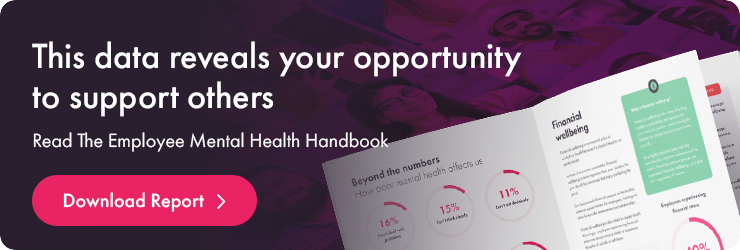Understanding how to talk about mental health in the workplace is an important skill we should all master. But it’s not as easy as it sounds.
More people are talking about mental illness than ever before, but less than half of UK employees would be comfortable speaking to their line manager about it, according to data from the Mental Health Foundation.
There’s still a stigma in many UK workplaces around mental health, which makes the process of opening up about it to employers and colleagues daunting.
In this guide, you’ll learn why it’s so important to talk about mental health at work and how you can start talking about your own.
Mental health at work statistics
It’s important for everyone to realise just how common mental health issues are, especially within the workplace.
Incidences of poor mental health in the workplace are extremely common. Champion Health’s own mental health statistics show that of a sample of 4,170 employees, 76% are experiencing moderate to high levels of stress.
Levels of anxiety are also high, with 60% of individuals experiencing at least mild symptoms of anxiety, and 25% experiencing clinically relevant symptoms of anxiety.
Finally, 56% of employees said they are experiencing at least mild symptoms of depression, with 25% reporting symptoms that are clinically relevant.

Why is mental health at work important?
Put simply, mental health at work is just as important as it is at home, or anywhere else.
Humans love to mentally compartmentalise, keeping our work and private lives separate. However, while this approach sounds logical, it’s not how our brains are wired.
Issues at home deplete our personal resources, making it more difficult when work demands increase.
In the same way, workplace issues will spill into our personal lives and this could worsen our mental health.
“I never realised the effect of mental health in the workplace until my mentor took his own life after a short bout of workplace stress. We must take mental health seriously, both at home and in the workplace,” says Harry Bliss, CEO and co-founder of Champion Health.
What’s more, ensuring we support our mental health is also crucial for our performance at work. If we’re struggling and unhappy, we’re going to be less productive.
If you’re an employer, there’s also a huge financial impact from poor mental health. Deloitte’s flagship report on workplace wellbeing revealed that the average cost of poor mental health was £1,652 per employee per year.
Deloitte’s report also showed that, for a financial services business with 1,000 staff, the average cost of poor employee mental health works out at £3,245. Across the year, this will cost that organisation £3.2 million.
Talking about mental health at work – and at home – is the first step to supporting yourself and others. So, let’s look at how you can start talking about mental health in the workplace.
How to talk to your employer about mental health
Opening up about your mental health is your choice, and you are never obliged to declare any mental illness to your employer.
However, if your mental health is significantly affecting your work, it’s best to let your employer know. In this way, it’s no different to reporting a physical health issue.
By opening up to them, you are giving your employer the opportunity to appropriately support you; ultimately, they can only help with issues they know about.
Understanding what you are struggling with, and how it affects your work, gives them the chance to tailor your environment to your needs.
If you do decide to open up to your employer, consider who you would feel most comfortable talking to. If you have a good relationship with your manager, you could talk to them. Otherwise, it may be better to contact your HR department.
Also consider how much information you want to give. You can say as much or as little as you want to. You don’t have to go into personal details if you don’t feel comfortable doing so; you could just focus on how your mental health is impacting your job.
It may also be worth considering beforehand what you are looking to gain from the conversation. Is it some time off? Is it more flexible deadlines? Is it just an understanding of why your work might be impacted?
Having a clear idea of how your organisation might be able to help you could make their job easier.
Remember that by talking to your employer about your mental health, you are not burdening them. It’s in their interest to listen and support you.
How to talk to your colleagues about mental health
The conversation about mental health is getting louder, but it can still be an extremely difficult subject to discuss with your colleagues.
And again, you are under absolutely no obligation to, if you don’t want to.
Ultimately, the relationship you have with your colleagues will determine how comfortable you feel having this conversation.
However, constantly trying to hide issues from colleagues can quickly become exhausting, particularly if your mental illness is affecting how you work.
Making your colleagues aware of any challenges you’re facing might help them better understand your behaviour. It could also give you an additional avenue of support.
It’s possible that you’ll even find others who empathise and are living with their own mental health challenges too.
Before approaching your colleagues, it might be helpful to plan what you are going to say, which can help you cover the points you want to cover. It may also help you practice how the conversation might flow.
When should you bring up mental health in the workplace?
The answer to this question is very subjective, and there is no right or wrong time to bring up your mental health. The most important thing is to speak at a time when you feel comfortable having the conversation.
There’s a tendency for people to only approach the subject when they are struggling.
However, you may find yourself able to talk more openly and articulate what you are going through more easily, by speaking at a time when you feel well.
By doing this, you will be taking proactive steps towards looking after your mental health at work, rather than only reacting when you are struggling.
Is mental health a disability at work?
Your mental health is considered a disability if it has a long-term effect on your normal day-to-day activity. If this is the case for you, then your employer has a legal obligation to support you.
Once they are aware of any disabilities, the 2010 Equality Act dictates that employers have a legal duty to make ‘reasonable adjustments’.
The Equality Act also forbids companies from discriminating in the recruitment, retaining or promotion of staff.
If your company is abiding by the law, then you have no reason to worry that disclosing your mental health condition will impact your employment prospects.
If you are concerned that your employer may be discriminating against you, then Mind provide some guidance on the steps you can take.
What help is available?
You could first look for support within your own company, particularly if they have Employee Assistance Program (EAP) or mental health first aiders. If you need to look outside the company, you should initially contact your GP. They can then refer you on to further services.
In the case of an emergency or crisis you should contact your local A&E.
Other great providers of mental health services include Mind, Samaritans and Rethink Mental Illness.
Top tips on dealing with mental health in the workplace
We all want to create an environment in which we can be successful at work. In some cases, in order to do this, we may have to admit that we are struggling with our mental health.
Opening up about your mental health is by no means easy. It takes a tremendous amount of courage. So firstly, and most importantly, only speak about things you feel comfortable discussing.
Remember that you will most probably not be alone in feeling like this. The statistics show how prevalent mental health issues in the workplace are, so you might be surprised at how many people are experiencing something similar to you.
If you open up about your mental health, you may even experience others approaching you to talk about their own problems. In this way, you’re playing your part in breaking down the stigma around mental health in the workplace.
If the thought of this makes you nervous however, it might be best to think about how you would handle the conversation.
And finally, try to be open and honest. Remember that most people will want to understand what you’re going through and help you out.
It’s not weak to speak
Talking to others about your mental health at work does not make you weak. On the contrary, it shows a tremendous amount of strength.
If you find the courage to talk about your mental health, you help yourself, your company, and future employees who may find themselves struggling in the same way.






